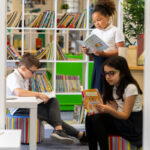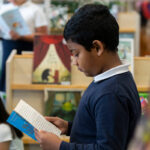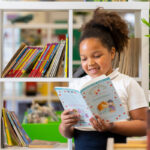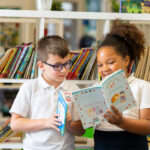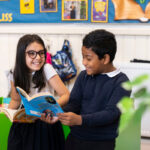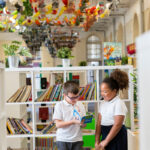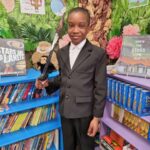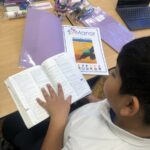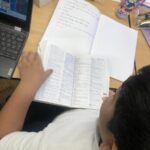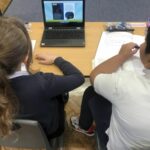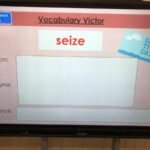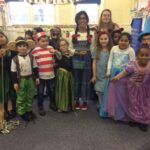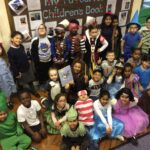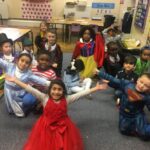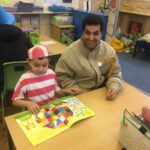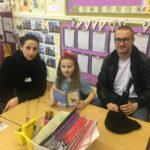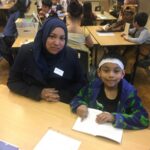Manor’s reading curriculum and approach is designed to enthuse children about reading, making them life-long readers. They will have the knowledge, skills, vocabulary and attributes to ensure that they are able to use reading to broaden their experiences and their views, and are able to clearly articulate their views and preferences in a range of contexts, preparing them well for the next stage of their education.
Our curriculum units have ‘curriculum bookshelves’ that enable children to explore texts linked to our units and school threads to deepen their understanding. Please click the link below for further information about our intent and impact with reading.
Spoken Language
At Manor, we recognise that spoken language is very important to our pupils, many of whom speak English as an additional language. Modelling appropriate and expressive speech is an integral part of our teaching, both within reading lessons and across the curriculum.
We believe that spoken language skills are an intrinsic part of the writing and reading process. We recognise and promote the value of reading in developing children’s vocabulary and understanding of the world
Reading
We recognise that reading is a core tool for life and we aim to foster a love of reading in our children. We have identified that children need to be heard reading regularly and be provided with reading opportunities across the curriculum. The school teaches and develops reading through a whole-class approach using a balance of short quality texts (Language and Literacy) and longer texts, such as chapter books. The school further promotes reading by timetabling (3.00-3.15pm) dedicated ‘Drop Everything and Read’ and class novel sessions where teachers read high quality texts to promote a love of reading.
Through reading, pupils are introduced to new vocabulary that can then be used in their own writing and speech. Time is spent discussing vocabulary – including the explicit teaching of unknown or technical vocabulary and investigating double-meaning words, devising strategies to read around a text for sense.
Manor Primary also promotes the use of the local library service. The school actively takes part in special events as part of World Book Day and the summer reading challenges.

Our middle floor fiction library
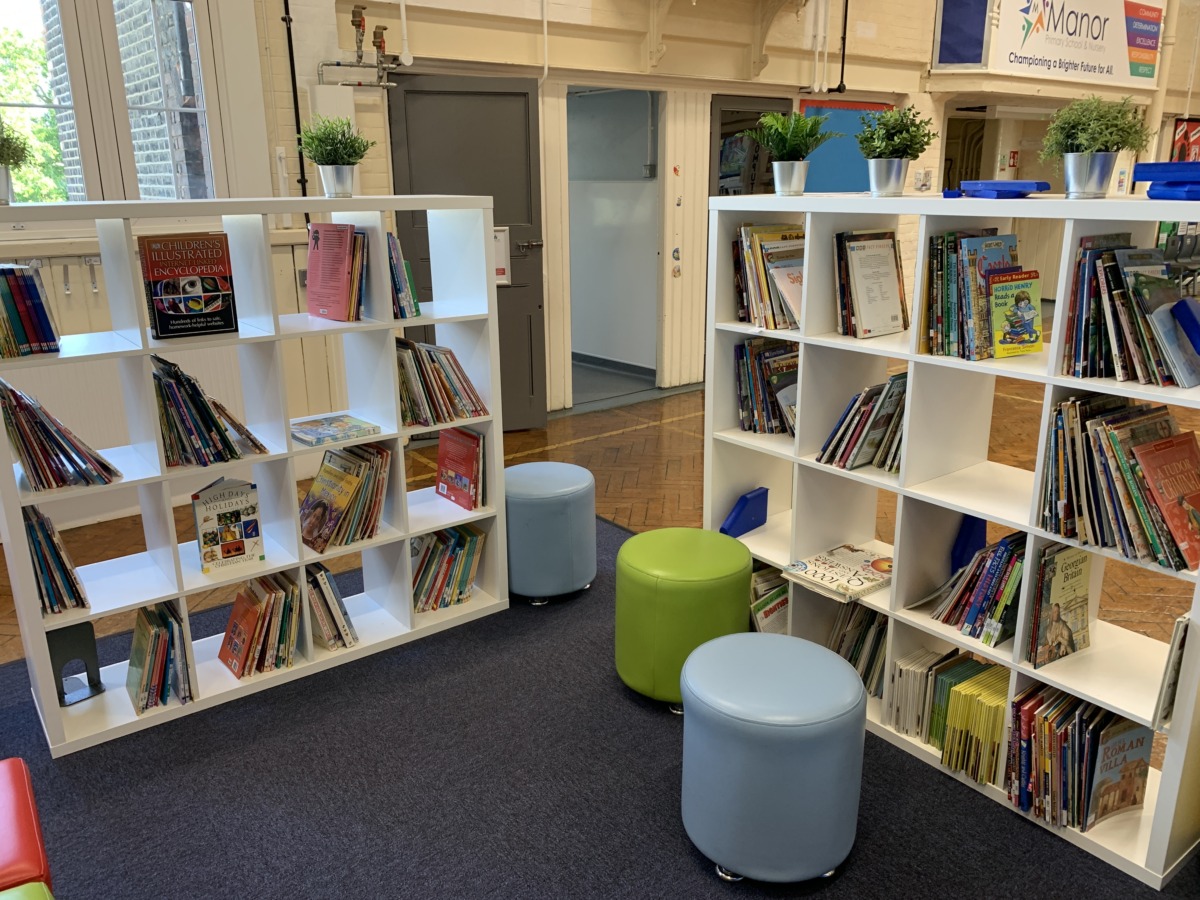
Our top floor non-fiction library
Word Reading
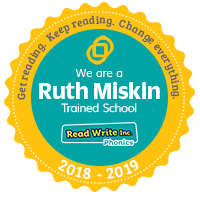
Reading is taught daily Manor Primary on a daily basis. We use a systematic approach to teach early reading using the Ruth Misken model of RWI. Pupils are grouped accordingly to the reading ability across phases. Class teachers have overall responsibility of the teaching of reading within their class, however, a number of teaching assistants and HLTAs are trained to teach RWI and have their own group. The RWI leader oversees all groups and provides on-going support in the delivery.
It reception, focus is on children sounding and blending unfamiliar printed words quickly and accurately. Children are taught:
- To discriminate between separate sounds in words
- Grapheme-phoneme correspondences
- To apply the skill of blending phonemes in order, all through a word to read it
- To recognise sight vocabulary identified as ‘tricky words’
It is the aim at Manor, that by the end of KS1, all children should be able to decode quickly in order for them to be able to develop the breadth and depth of the reading and become enthusiastic readers. As soon as pupils can decode and read fluently, they are taken off the RWI programme and learn through a range of high quality short and longer texts.
Any pupils that are not making expected progress will be identified through the on-going use of data to inform staff and will receive 1:1 RWI support in the afternoons.
Comprehension
Comprehension skills are taught across the school. In EYFS, children are taught and encouraged how to use a range of texts to find information, how to form their own opinions of a text and share their ideas in a range of situations.
From Year 1 to the end of Key Staff 2, pupils are taught specific skills which enable them to decode meaning of a text and how to form and express their own personal opinions and make comparisons. Teachers use the performance indicators for reading to question pupils and ensure their understanding of a text.

Home reading
All children are provided with a choice of fiction and non-fictions books from the classroom and school library including our online book library through Bug Club. Classroom bookcases are organised to be easily accessible. Texts linked to topics will also be displayed and made available in classes.
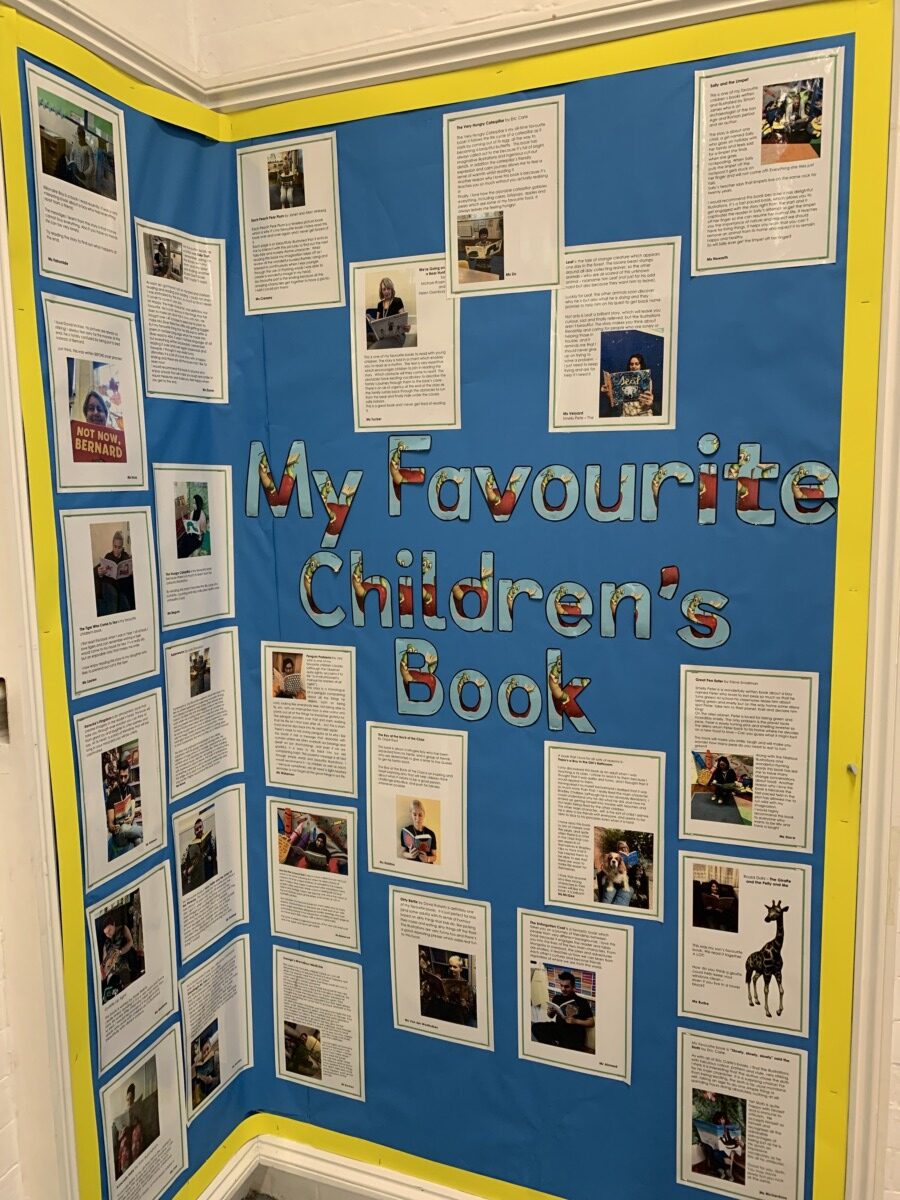
A display of staff promoting their favourite children’s book. What’s yours?


